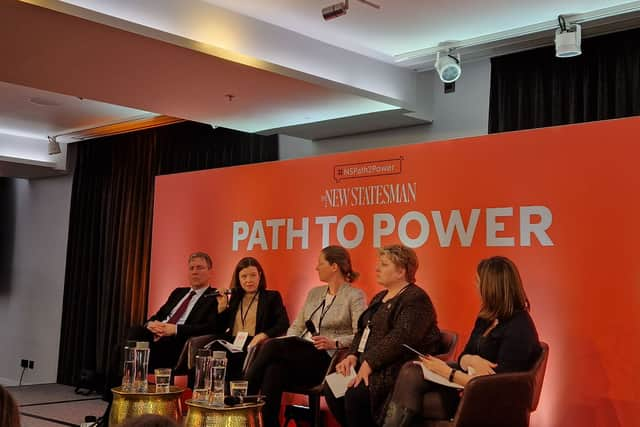Facebook scams: onus is on tech giants to make sure Online Fraud Charter is more than just ‘a piece of paper’
and live on Freeview channel 276
One morning, earlier this year, Etsy entrepreneur Sarah-Jane Lewis woke up, checked her emails and found her Facebook profile had been hacked overnight. There was no way of rescuing her account as Meta, Facebook’s parent company, has no verification requirement when changing passwords.
“I had lost everything,” the 41-year-old tells me. “I eventually found out they were selling bedsheets to Vietnam and racking up advertising spending. They were also able to access all my personal photographs, pictures of my children.”
Advertisement
Hide AdAdvertisement
Hide AdSarah-Jane tried to alert Meta that her account had been hacked, but got lost down a rabbit hole of FAQs and online forms. So she did what anyone in her situation would do, she told her mum.
Fortunately, the bombardment of messages from mum Karen, 61, to the hackers, eventually made them give in, and they sent Sarah-Jane the new password and authentication code. But this was not without them spending more than £1,000 on Facebook advertising for their products.
And Sarah-Jane is not alone in being targeted with online scams. Fraud now makes up 41% of the country’s total crime, with the Office for National Statistics’ latest 12-month data showing that recorded offences in England and Wales rose by 15% to 1.1 million offences.


In particular, fraudsters are using Meta platforms, mainly Facebook and Instagram, to carry out their crimes. In May, the bank TSB found that 80% of the fraud cases it was refunding originated through Meta. During Black Friday, Lloyds’ Bank revealed that more than 70% of shopping scams start through Mark Zuckerberg’s company.
Advertisement
Hide AdAdvertisement
Hide AdChartered cyber security consultant James Bore told NationalWorld he had seen four main types of scams on Meta platforms. Firstly, Facebook Marketplace fraud by both buyers and sellers. Vendors frequently will sell non-existent items, James said, while buyers often use overpayment scams as well as haggling in person after agreeing a price.
“Takeovers of social media accounts are yet another one,” James said, “using someone’s carefully built following to promote cryptocurrency scams, knock-off products.” And the final type is phishing attacks to steal account information, which is then sold on to criminal marketplaces. That happened to your author a few years ago.


“Fraud, overall, now makes up at least 41% of crime in the UK – and most of that is digital or computer fraud in at least part,” James explained. “The platforms have not helped this, as they are built to profit from their users and advertisers and have limited incentives to protect them beyond the minimal efforts they already make – anything more is too costly. Anyone who has tried to report fraudulent content will be well aware of how poor the response can be, on even the most obvious of scams.”
Advertisement
Hide AdAdvertisement
Hide AdThis was Sarah-Jane’s experience. She told NationalWorld: “You just end up in a loop of FAQs on a webpage, there is no way to chat to somebody or email somebody. You end up giving up - there’s no personal or virtual contact to report your issue.
“My 61-year-old mother abused the fraudsters constantly, and they just gave up. I got away with about £1,000 [of advertising spent by the hackers], but there’s no way to contact Facebook to say this is not me. I know people that had £20,000 and £40,000 spent on advertising accounts - it’s just crazy … it’s scary stuff.”


Now Sarah-Jane says she won’t put any more personal photographs on social media: “I won’t put pictures of the kids up. It’s sad, you want to use them but they’re not protecting you as a user.”
A lot of people now see online scams and attempts at digital fraud as part of life in the age of social media. If someone tries to hack us, often we just shrug it off. But fraud is often used to fund criminal gangs, and linked to a number of other incredibly serious offences.
Advertisement
Hide AdAdvertisement
Hide Ad“It’s so often used to fund other serious crimes, particularly terrorism, drug smuggling and human trafficking,” Liz Ziegler, Lloyds’ fraud and financial crime director, explained. She says if the government wants to reduce serious crime, tackling fraud is a huge part of that.
“Banks have been at the fore-front for a while in the efforts to stop scams, but we can’t tackle it alone,” she told the New Statesman’s Path to Power conference. “Currently the tech sector and telecommunications companies do not contribute to reimbursing victims of fraud, despite nearly 80% of fraud cases being facilitated through online platforms.
“We need to hold these sectors to account, and incentivise greater action to tackle fraud at source. We’re calling on the government, and any future government, to ensure tech and telecommunications reimburse victims, and also be accountable for stopping the fraud. We also need legislation to mandate information sharing as that's the best way of tackling it.”


At the same conference, Labour’s Shadow Attorney General Emily Thornberry suggested that Meta, as well as banks, should be legally required to refund scam victims and fund a national fraud prevention strategy. Thornberry said she hoped this would incentivise Meta to bring in more robust anti-fraud measures.
Advertisement
Hide AdAdvertisement
Hide AdBut what is the government doing? Well, this week, executives from a number of leading tech companies, including Meta, X and Google, congregated at Lancaster House on The Mall to sign the voluntary Online Fraud Charter.
This requires sellers on peer-to-peer marketplaces to be verified, as well as new advertisers, and there are stricter rules around removing fraudulent content. Users on online dating services will have the opportunity to prove they are who they say they are to try and prevent romance scams. The firms have six months to get their websites and apps up to speed.


New Home Secretary James Cleverly was bullish about the Online Fraud Charter saying “it is a big step forward in our efforts to protect the public from sophisticated, adaptable and highly organised criminals”.
He explained: “An agreement of this kind has never been done on this scale before and I am exceptionally pleased to see tech firms working with us to turn the tide against fraudsters. Our work does not end here – I will continue to ensure we collaborate across government, and with law enforcement and the private sector, to ensure everyone in the UK is better protected from fraud.”
Advertisement
Hide AdAdvertisement
Hide AdHowever experts say the charter’s effectiveness is entirely dependent on the tech companies. Cyber security expert James told NationalWorld: “The charter is a nice piece of paper, but without effective enforcement action it means very little. Less than 1% of police funding goes to specialised fraud investigation and enforcement.
“Action Fraud was found unfit for purpose years ago and there has been no noticeable action to improve things, and it’s estimated that upwards of 80% of fraud goes unreported. Unless there’s more detail on how the platforms will be held to account for failing to prevent fraud, it will make little difference beyond being a very small step in the right direction.”
While TSB’s director of fraud prevention Paul Davis added: “We’ve campaigned for years for tech companies to do far more to prevent the fraud that's become rife on social media platforms. Now we have the charter, it's down to all signatories to match their commitment with meaningful concerted action - putting the right protections in place to reduce fraud and take responsibility to protect millions of consumers on their platforms."
A Meta spokesperson told NationalWorld: “With tens of millions of people using our apps daily in the UK, we recognise our important role in tackling the industry-wide issue of online purchase scams and have systems in place to block scams. We encourage our community to report scams immediately so we can take action and we'll continue equipping customers with knowledge to transact securely and avoid fraud.”
Advertisement
Hide AdAdvertisement
Hide AdRalph Blackburn is NationalWorld’s politics editor based in Westminster, where he gets special access to Parliament, MPs and government briefings. If you liked this article you can follow Ralph on X (Twitter) here and sign up to his free weekly newsletter Politics Uncovered, which brings you the latest analysis and gossip from Westminster every Sunday morning.
